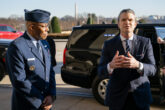December 24, 2019
America never committed to training Afghan forces. I know because I tried.
I first met Maj. Sboor in 2009 as he waited to take over his own Afghan army battalion. We were working together as operations officers of partnered Afghan and U.S. infantry units in Konar province. Sboor was stern, professional and unflinchingly loyal to his commander, but we also noticed his competence, as his unit just performed better whenever he was left in charge. Most of the Afghan officers in Sboor’s cohort claimed lineage to either the mujahideen or the Soviet Union, with the advantages and disadvantages that came with each. But Sboor seemed more like the motivated junior officers we encountered: They had little experience with the turmoil of the 1980s and 1990s and were anxious to make their mark on Afghanistan once the old generation faded.
But the promise of Sboor and so many like him went unfulfilled and was doomed from the start. Since the release of The Afghanistan Papers, many have argued whether our leaders were lying, or just delusional in their plans and assessments of progress. But that distinction is irrelevant. The fact is that training the Afghan security forces was never a priority for the military, despite years of declarations to the contrary. The result is that we designed a force that was incapable of fighting without U.S. support. Even worse, we failed to address the endemic corruption that would undermine the legitimacy of both Afghan forces and the central government in the eyes of the Afghan people.
Read the full article in The Washington Post.
More from CNAS
-
National Security Human Capital Program
Defending the Army’s Command Assessment ProgramThe concept for CAP — developed during the first Trump administration — benefited from the guidance, input and oversight from the foremost scholar and practitioner on military...
By Katherine L. Kuzminski
-
National Security Human Capital Program
‘Women Don’t Just Achieve…They Excel’: Fmr. Marine Corps Attack PilotDr. Kyleanne Hunter, former Marine Corps attack pilot and CEO of Iraq & Afghanistan Veterans of America, says “women are the fastest growing group of veterans” and “the fastes...
By Dr. Kyleanne Hunter
-
National Security Human Capital Program
Could the U.S. Bring Back the Draft?In this episode of At the Boundary, GNSI’s Dr. Guido Rossi sits down with Katherine Kuzminski, Director of Studies at the Center for a New American Security (CNAS), to explore...
By Katherine L. Kuzminski
-
National Security Human Capital Program
Hegseth Brings the Culture War to CombatThe fundamental challenge of military leadership lies in creating cohesive teams that can work together in an environment of mortal risk and, when called upon to do so, use le...
By Dr. Jason Dempsey




